The Capillary Wave

# 7. What Are The Police? [Part 1]
A Capillary Wave Article Via: C M EDWARDS November 2023
An Examination Of The Roles Of A Police Constable And Police Officer
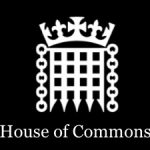
Definitions [Top]
metropolitan (n.)
mid-14c., “bishop having general superintendency over other bishops of his province,” from Late Latin metropolitanus, from Greek metropolis “mother city” (from which others have been colonized), parent state of a colony,” also “capital city,” and, in Ecclesiastical Greek, “see of a metropolitan bishop,” from meter “mother” (see mother (n.1)) + polis “city” (see polis). In the early church, the bishop of a municipal capital of a province or eparchy, who had general superintendence over the bishops in his province. In modern Catholic use, an archbishop who has bishops under his authority; in the Greek church still the bishop of a municipal capital of a province, ranking above an archbishop. also from mid-14c.
polis (n.)
“ancient Greek city-state,” 1894, from Greek polis, ptolis “citadel, fort, city, one’s city; the state, community, citizens,” from PIE *tpolh- “citadel; enclosed space, often on high ground; hilltop” (source also of Sanskrit pur, puram, genitive purah “city, citadel,” Lithuanian pilis “fortress”). also from 1894
politic (adj.)
early 15c., politike, “pertaining to public affairs, concerning the governance of a country or people,” from Old French politique “political” (14c.) and directly from Latin politicus “of citizens or the state, civil, civic,” from Greek politikos “of citizens, pertaining to the state and its administration; pertaining to public life,” from polites “citizen,” from polis “city” (see polis). It has been replaced in most of the earliest senses by political. From mid-15c. as “prudent, judicious,” originally of rulers: “characterized by policy.” Body politic “a political entity, a country” (with French word order) is from late 15c.
polity (n.)
1530s, “civil organization;” 1640s, “an organized human society or community, body of persons forming a community governed according to a recognized system of government,” from French politie (early 15c.) or directly from Late Latin polita “organized government” (see policy (n.1)).
police (n.)
1530s, “the regulation and control of a community” (similar in sense to policy (n.1)); from Middle French police “organized government, civil administration” (late 15c.), from Latin politia “civil administration,” from Greek polis “city” (see polis). Until mid-19c. used in England for “civil administration;” application to “administration of public order, law-enforcement in a community” (1716) is from French (late 17c.), and originally in English referred to France or other foreign nations. The sense of “an organized civil force for maintaining order, preventing and detecting crime, etc.” is by 1800; the first force so-named in England was the Marine Police, set up 1798 to protect merchandise at the Port of London. Meaning “body of officers entrusted with the duty of enforcing laws, detecting crime, etc.” is from 1810. In its most common acceptation, the police signifies the administration of the municipal laws and regulations of a city or incorporated town or borough by a corps of administrative or executive officers, with the necessary magistrates for the immediate use of force in compelling obedience and punishing violation of the laws, as distinguished from judicial remedies by action, etc. The primary object of the police system is the prevention of crime and the pursuit of offenders; but it is also subservient to other purposes, such as the suppression of mendicancy, the preservation of order, the removal of obstructions and nuisances, and the enforcing of those local and general laws which relate to the public health, order, safety, and comfort. [Century Dictionary, 1895]
policy (n.1)
[“way of management”], late 14c., policie, “study or practice of government; good government;” from Old French policie (14c.) “political organization, civil administration,” from Late Latin politia “the state, civil administration,” from Greek politeia “state, administration, government, citizenship,” from politēs “citizen,” from polis “city, state” (see polis). From early 15c. as “an organized state, organized or established system of government or administration of a state,” but this sense has gone with polity. Also from early 15c. as “object or course of conduct, or the principles to be observed in conduct,” and thus “prudence or wisdom in action” generally, but especially “the system of measures or the line of conduct which a ruler, minister, government, or party adopts as best for the interests of the country in domestic or foreign affairs.”
civil (adj.)
late 14c., “relating to civil law or life; pertaining to the internal affairs of a state,” from Old French civil “civil, relating to civil law” (13c.) and directly from Latin civilis “relating to a society, pertaining to public life, relating to the civic order, befitting a citizen,” hence by extension “popular, affable, courteous;” alternative adjectival derivative of civis “townsman” (see city).
Meaning “not barbarous, civilized” is from 1550s. Specifically “relating to the commonwealth as secularly organized” (as opposed to military or ecclesiastical) by 1610s. Meaning “relating to the citizen in his relation to the commonwealth or to fellow citizens” also is from 1610s.
secular (adj.)
c. 1300, seculer, in reference to clergy, “living in the world, not belonging to a religious order,” also generally, “belonging to the state” (as opposed to the Church), from Old French seculer, seculare (Modern French séculier) and directly from Late Latin saecularis “worldly, secular, pertaining to a generation or age,” in classical Latin “of or belonging to an age, occurring once in an age,” from saeculum “age, span of time, lifetime, generation, breed.”This is from Proto-Italic *sai-tlo-, which, according to Watkins, is PIE instrumental element *-tlo- + *sai- “to bind, tie” (see sinew), extended metaphorically to successive human generations as links in the chain of life. De Vaan also connects it with “bind” words and lists as a cognate Welsh hoedl “lifespan, age.” An older theory connected it to words for “seed,” from PIE root *se- “to sow” (see sow (v.), and compare Gothic mana-seþs “mankind, world,” literally “seed of men”). The ancient Roman ludi saeculares was a three-day, day-and-night celebration coming once in an “age” (120 years). Ecclesiastical writers in Latin used it as those in Greek did aiōn “of this world” (see cosmos). It is the source of French siècle “century.” The meaning “of or belonging to an age or a long period,” especially occurring once in a century, was in English from 1590s. From mid-14c. in the general sense of “of or belonging to the world, concerned in earthly more than in spiritual, life;” also of literature, music, etc., “not overtly religious.” In English, in reference to humanism and the exclusion of belief in God from matters of ethics and morality, from 1850s. Related: Secularly.
commonwealth (n.)
mid-15c., commoun welthe, “a community, whole body of people in a state,” from common (adj.) + wealth (n.). Specifically “state with a republican or democratic form of government” from 1610s. From 1550s as “any body of persons united by some common interest.” Applied specifically to the government of England in the period 1649-1660, and later to self-governing former colonies under the British crown (1917). In the U.S., it forms a part of the official name of Pennsylvania, Massachusetts, Virginia, Kentucky, and Puerto Rico but has no special significance.
common (n.)
c. 1300, “a fellowship or brotherhood; early 14c., “people of a community or town, freemen, citizenry;” late 15c., “land held in common,” from Old French commune and Medieval Latin communia, and partly from common (adj.). Also compare commons. Latin communis “common, general” (adj.) also served as a noun meaning “common property; state, commonwealth.”
officer (n.)
early 14c., “one who holds an official post, one entrusted with a responsibility or share of the management of some undertaking” (originally a high office), from Old French oficier “officer, official” (early 14c., Modern French officier), from Medieval Latin officiarius “an officer,” from Latin officium “a service, a duty” (see office).
In Middle English also “a servant, a retainer of a great household; an official at court” (late 14c.). From late 14c. as “a military retainer,” but the modern military sense of “one who holds a commission in the army or navy” is from 1560s. Applied to petty officials of justice from 16c.; U.S. use in reference to policemen is from 1880s.
Introduction
At The Capillary Wave via the many public articles here, we examine precisely how you are governed, and we explain how you fit in to the system of law and governance. We show you in detail how you entered in to the legal system , and the title and role you took on upon entry; that of a third class citizen. If you are new to this subject it might be advisable to read our numbered articles in ascending order; this will give you a great insight into law and governance and what that means for you as a citizen.
In my previous article I explained the two main areas of law at work in Britain and many other countries. These two areas of law are known as jurisdictions. These jurisdictions apply to any one landmass such as: Britain, Canada, Australia, or America. We have discovered that every landmass, also has a polity associated with it, operating from the landmass. The polity / body politic (government) controls the citizenry. The body politic (polity) which is in administration at Britain is titled: UNITED KINGDOM (UK), at [central] America the body politic is the USA, as another example. The UK is the body politic, and its citizenry are, among other things, a franchisee, its employees. A National Insurance number enables you to make contributions to your state pension, and pensions are run by employers. We have other articles here that explain the franchise relationship.
In my previous article Article #6, I explained the two areas of law, the two areas of jurisdiction, that applies to any one landmass. We have discovered that every landmass, also has a polity operating there which controls the majority of that population; the citizenry. The polity in administration at Britain is titled: UNITED KINGDOM (UK). The UK is the body politic, and its citizenry are, among other things, its employees. A National Insurance number enables you to make contributions to your state pension. Definition of pension from Blacks Law Dictionary 8th Edition:
- Definition of pension from Blacks Law Dictionary 8th Edition: Pension. A fixed sum paid regularly to a person (or to the person’s beneficiaries), esp. by an employer as a retirement benefit. Cf. ANNUITY (3). [Cases: Pensions. 92, 24-27. C.J.S. Pensions and Retirement Plans and Benefits §§ 7, 16-17, 19.]
pension (n)
late 14c., pensioun, “payment for services,” especially “a regular reward or annual payment out of a will or benefice” (early 14c., in Anglo-Latin), from Old French pension “payment, rent” (13c.) and directly from Latin pensionem (nominative pensio) “a payment, installment, rent,” from past-participle stem of pendere “to hang, cause to hang; weigh; pay” (from PIE root *(s)pen- “to draw, stretch, spin”). For the financial sense of the Latin verb, see pound (n.1). Meaning “regular payment to a person in consideration of past service” is from 1520s, hence “periodic payment made to a person retired from service on account of age or disability” (originally especially government pay to soldiers and sailors). Meaning “boarding house, boarding school” is attested from 1640s, from a sense in French based on the meaning “money paid for board,” and in English it is usually in reference to places in France or elsewhere on the Continent.
There is a lot of information and evidence in the previous articles, which show that a citizen is effectively an employee of the state. The word definitions also confirm this as only an employer can run a pension scheme. All of this makes sense when you consider what a polity is, and what the words policy, and police mean; this has been explained in article #3. It is no coincidence that those words are synonymous with each other. Understanding the above is crucial when it comes to the roles of a Constable, and a Police Officer. These are two separate roles, carried out by the one man or woman. The Monarch also has two roles of state, he / she actually wears two hats for their coronation. The Monarch is offered one crown for state duties to rule over his / her citizenry, and another crown from God to serve Gods people. The two crowns, for the two jurisdictions of state.
Two crowns feature in coronations. The first is the St Edward’s Crown (of God), named after St Edward the Confessor, which is the one placed on the monarch’s head during the crowning. This is followed by the Imperial State Crown (of state – UK)
The Queen’s coronation is linked below, where the two separate crowns are worn in the ceremony, denoting the two separate roles and jurisdictions of the Monarch can be seen:
A Policeman / woman also covers two areas of jurisdiction. This is why they have two “offices of state”, that being the office of a Constable, and the office of a Police Officer. A Constable covers the lawful jurisdiction concerning matters of harm and injury, at Britain. The Police Officer covers the legal jurisdiction of the UNITED KINGDOM, the Jurisdiction of the polity, policing the policies of the polity. A Police Officer polices the employees, to ensure they do not break the corporate policy of the polity: UNITED KINGDOM.
See if you can find your local Policy Enforcement company at Dunn and Bradstreet Business Search Directory using the link below:
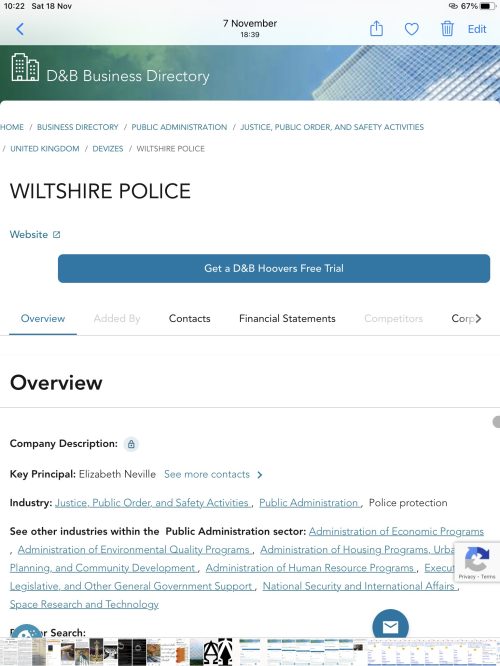
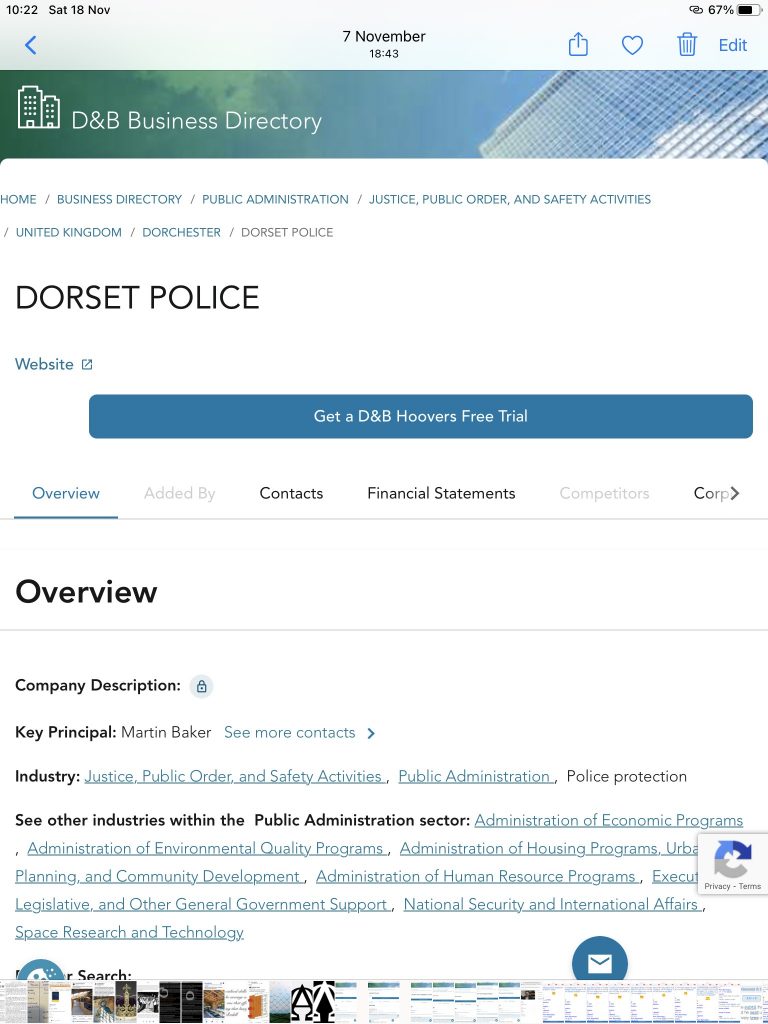
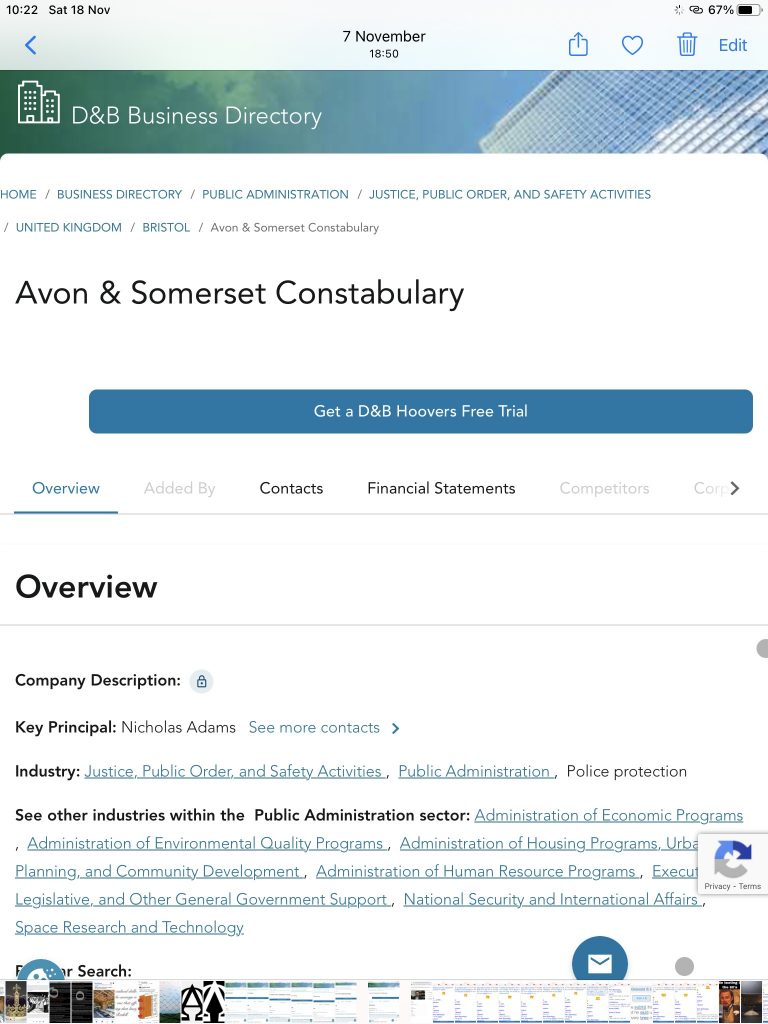
Are You A Constable, Officer? Top
The Constable (Peace Keeper)
Every sworn Police Officer in England and Wales is a Constable, irrespective of rank.
These powers were first given to the men who were the stable lads for the local Count. They would be the ones who were called upon to keep the peace if things ever got out of hand. So the word Constable is derived from Count Stable:
Constable – c. 1200, “chief household officer;” c. 1300, “justice of the peace,” from Old French conestable (12c., Modern French connétable), “steward, governor,” principal officer of the Frankish king’s household, from Medieval Latin conestabulus, from Late Latin comes stabuli, literally “count of the stable” (established by Theodosian Code, c. 438 C.E.), hence, “chief groom.”
Each sworn Constable is an independent legal official, as attested in the below photograph from the Police Federation website, and has personal liability for their actions or inactions. The Chief Constable also has a level of responsibility and a duty of care. This applies to sworn Constables, and not necessarily to those acting in the role of a Police Officer, for which there is limited liability under the corporation for which the Officer is acting on behalf of. In the same way that if a TESCO employee stacked the Baked Bean tins too high, and they fell down on someone injuring them, it would be TESCO that could get sued at law, and not necessarily the employee personally. The role of Constable carries a personal liability for the individual actions of that man/woman. The role of Police Officer does not necessarily have personal liability attached. When acting as a Police Officer the individuals liability falls under the corporate body of the police force itself. The same individual can act in either capacity: Police Officer (statutory) or Police Constable (common law), just as the Monarch does.
An interesting link about limited liability for certain employees:
Source of photograph and police oath:
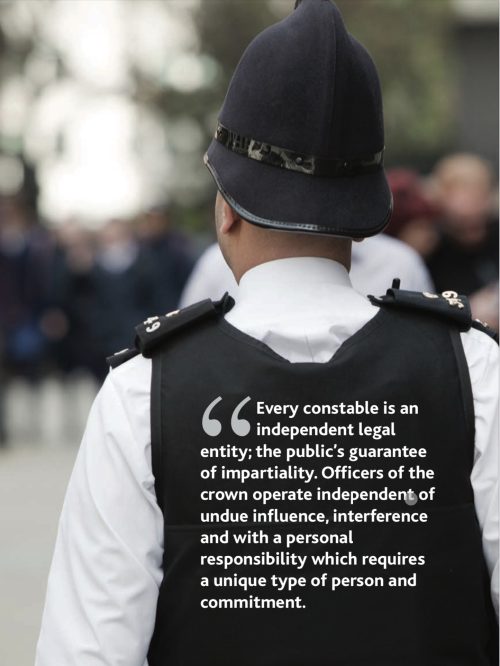
Policy Enforcers (Police Officers)
Police Officers enforce the corporate policies on behalf of the Executive, who themselves act on behalf of the government, for the body politic known as: UNITED KINGDOM.
Police Officers have statutory (legal) jurisdiction over “persons” but importantly, not, “people”. A Police Officers liability is covered by the company they work for (Wiltshire Police corporation, in this example). If a Police Officer is negligent then the corporation is liable, as is the same in many corporate relationships.
Constables are under the common law jurisdiction, which is not necessarily a statutory jurisdiction (policy). A Constable operates under the common law dealing with both the “people” and “persons”. Here is a good overview of the jurisdiction and role: The Jurisdiction Which Touches Both The Legal and Lawful, Article #6.
A Police Officer swears an oath or attestation and swears allegiance to the King at the point of becoming a Constable. A Police Officer takes this oath to become a Constable, in addition to his/her role as an Officer:
“I do solemnly and sincerely declare and affirm that I will well and truly serve the King in the office of constable, with fairness, integrity, diligence and impartiality, upholding fundamental human rights and according equal respect to all people; and that I will, to the best of my power, cause the peace to be kept and preserved and prevent all offences against people and property; and that while I continue to hold the said office I will to the best of my skill and knowledge discharge all the duties thereof faithfully according to law.”
Note: The affirmation expressly uses the word “people” (lawful jurisdiction) and not “person”:(statutory policy of the corporation). There is nothing in that oath about serving the Executive branch of governance, the government, or the statutes and Acts, which are the policies for the Executive to execute.
Make sure you are respectful to Constables, they are there to protect you (people) and “your property” against “persons” – allow some time to reflect on that sentence.
A Constable is personally liable for their actions. By examining the oaths of office we can see the direct line of authority: The King swears an oath to God, and all the Police Officers swear an oath to the King, logically then, they are all under God and The Bible, KJV 1611. You do not need to be Detective Inspector to work that out.
Just as the words “Constable” and “Officer” have different meanings and jurisdictions, so do the words “people” and “persons”; they are completely different words and therefore have completely different meanings legally speaking, and are in very different jurisdictions. If the word is different, then so is the meaning and jurisdiction, other wise you would not need a different word to describe the “thing” – a strawberry is a strawberry, there is no other word for the thing. Hopefully you are not confused, both roles are played by the same individual. You too can wear many hats: dad/brother/son, boxer/netball player, manager/employee. Never turn up to work with your boxing hat on, or a Constable might pay you a visit.
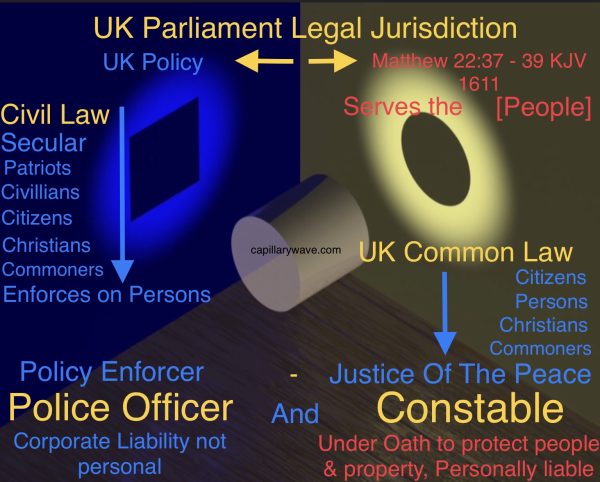
Why anyone would voluntarily wish to deal with a “Police Officer”, a policy enforcer, is beyond me, especially as every Police Officer has sworn an oath as a Constable under his / her own personal liability. If you find yourself dealing with a Police Officer that you may wish to hold directly liable for his / her actions, it might be wise to confirm with that individual that he / she is a Constable, and then hold them to their oath. The very oath whereby he / she has sworn to protect you as a people. Obviously it is no good claiming to be one of the people if you are acting foolishly like, or as; a person. See – Persons and People Article #3
oath (n.)
Middle English oth, from Old English að “judicial swearing, solemn appeal (to deity, sacred relics, etc.), in witness of truth or a promise,” from Proto-Germanic *aithaz (source also of Old Norse eiðr, Swedish ed,
attest (v.)
1590s, “bear witness to, officially confirm; give proof or evidence of,” from French attester (Old French atester, 13c.) “affirm, bear witness to,” from Latin attestari “confirm, prove,” literally “bear witness to,” from assimilated form of ad “to” (see ad-) + testari “bear witness,” from testis “witness” (see testament). Related: Attested; attesting.
also from 1590s
faithful (adj.)
early 14c., “sincerely religious, devout, pious,” especially in reference to Christian practice; mid-14c., “loyal (to a lord, friend, spouse, etc.); true; honest, trustworthy,” from faith + -ful. From late 14c. in reference to a tale, a report, etc., “accurate, reliable, true to the facts.” The noun sense of “true believer, one who is full of faith” is from late 14c. (Church Latin used fideles in same sense). Related: Faithfully; faithfulness.
There is little doubt the Constable’s oath is in direct relation to Christianity and God. In other words, even a Constable is acting in service to God, according to Gods Will, whether he / she realises it or not, that is a fact. The role of Officer is a secular one serving the polity.
The position of Constable is not a new one, it was first mentioned in Acts of Parliament back in 1297, in the Magna Carta . There is also a Constable Protection Act of 1750. These roles of Constable were formed some five hundred and twenty nine years before the office of Police Officer was first legislated in 1829. The role of modern Officers as we know them are nothing new:
- Luke 12:58 KJV 1611 – When thou goest with thine adversary to the magistrate, as thou art in the way, give diligence that thou mayest be delivered from him; lest he hale thee to the judge, and the judge deliver thee to the officer, and the officer cast thee into prison
The word officer Is derived from the word overseer. An Archbishop is an overseer as we shall dig in to on another article.
- overseer (n.) late 14c., “supervisor, superintendent, one who looks over,” agent noun from oversee (v.). Specifically, “one who superintends workmen;” especially with reference to slavery, “one who has charge, under the owner or manager, of the work done on a plantation.”
A Police Officer does not have the powers to arrest anyone. Why would he / she? They are merely corporate employees, like a TESCO or WALMART employee. A Police Officer has the same powers of arrest that an ordinary citizen has. An ordinary citizen can legally make what is known as a citizens arrest. A Police Officer only gets the proper powers of arrest, after he / she has taken the oath above, which makes them a Constable. It is the Office of Constable that has the powers of arrest, not the Office of an ordinary Police Officer (policy enforcer).
Overstepping The Thin Blue Line
Most Police Officers that I have met – and I have met many – do not really understand their dual roles. It is hardly their fault as they have no training on such things. I have several friends who are active Police Officers of varying ranks; some quite high ranking, and some who have retired. I do not believe many of them truly understand the differences between an Officer and a Constable. It is not like they really need to know in practice, because how many of their citizenry know the difference? If we want a better police force, then perhaps we need to start by educating ourselves.
When I had my own planning permission wrangles with the local council, back in 2007, they would often come and visit me with a couple of Police Officers. I would always hold them to their role as a Constable, and hold them to their oath, which they did. I would always remind them of their personal liability, and I would remind them that they are here to protect me and the property, and not to enforce UK policy against me. In fairness to them, most Constables I met with agreed with me however, at that point of agreement, they should have turned around and asked the local council enforcement officers to leave; because the council officers were there purely on UK policy duty, and that did not apply to me. At least that was my position with the local council at that time.
If a Police Officer is ignorant of his / her dual roles and dual duties, that could become a problem for you. It could become their personal problem if they are there as a Constable, or their corporate employers problem if they are there as an Officer.
Given that most Officers have no real idea about their dual roles, it may be down to you either as a citizen, or a people, to hold them accountable. I say citizen or people because even citizens have legal rights and can (rarely) sometimes win against an unruly Officer.
If you are one of the people and you have an Officer or Constable who is negligent or carrying out some form of misconduct, then the issue will be taken much more seriously in my experience by the Crown. As with all of these legal and lawful issues, much depends on your status and capacity. Status is something a person has, or, you may be in the capacity as one of the people. Two very different positions at law as we have previously mentioned.
A solicitor for the citizenry who specialises in Police corruption and negligence is Iain Gould
A Police Officer is an overseer of all UK policy and citizens/persons. Very rarely does a slave win a case over an overseer, and why should they, they chose the role of slave, as a third class citizen?
A Constable is a justice of the peace, concerned only with the jurisdiction of harm, injury and loss to a people – common law. A Constable should not get involved in UK policy enforcement.
If you are a citizen of your country and a Police Officer is not quite doing their job properly, it is not very likely you will succeed in a case against a higher ranking officer than yourself; remember, you chose the lowest rank in society; that of a commoner. A Police Officer is a much higher rank than you, and specifically employed to keep the lowest ranks in line. How you became the Government.
Now I am sure you can see the relevance of the definition of the word: overseer.
A breach of a duty of care, or misconduct in a public office can be a very serious matter. The Crown Prosecution Service (CPS):
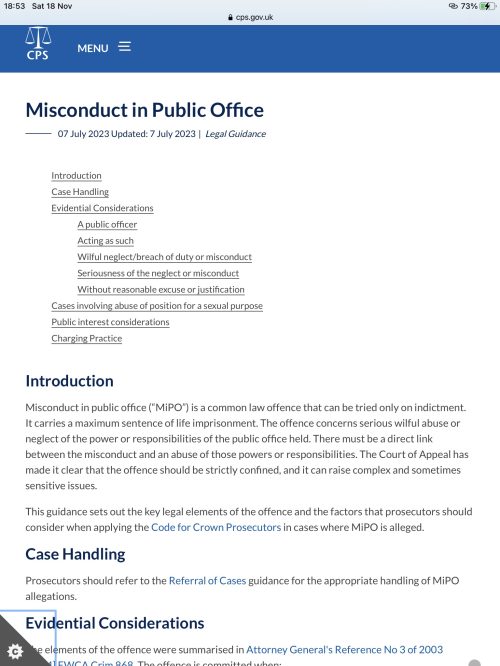
These Officers and Constables have a duty of care. A duty of care can be punishable in the criminal and civil jurisdictions:
If you feel that others would benefit from reading this article, please consider sharing it. If you would like to find out more about law and governance then you can start by reading my articles in ascending numerical order which will garner the best results for you.
More articles on Law and Governance can be read from the menu below.
If you feel like buying me a coffee, or making a donation, that would be greatly appreciated.
In good faith
CME